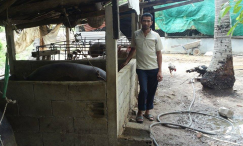Nut Chenda is the leader of Samros Tapen agricultural cooperative in Tapen village, Kraingleave commune, Bati district, Takeo province, Cambodia. After undergoing an agribusiness training from Farmer and Nature Net with AFOSP-MTCP2 support in 2014, he was able to sell a total of 46 piglets to a middle-man in the commune and get a profit of 5 million riels (USD 1,250).
In 2015, he formed a farmer pig raising group in the community with five members including two women for a capacity building and for connecting to the market. He shared technical knowledge to the members including how to select piglets, system for pig raising, and techniques on pig breeding.
The group aims to produce piglets for selling to other farmers in the village and even in the commune who want to raise pigs. The farmers in the village also aims to connect to the market.
In raising pigs, the group use rice bran and local feed rather than buying feeds from companies selling in the market. The price of pig raised using feed from the market is 7,500 riels per kilogram while pigs raised using local feed earn 8,500 riels per kilogram—which is 1,000 riels more.
The market for pigs raised using local feed is increasing, so Nut Chenda plans to increase the members of the cooperative, set up a pig raising farm and link the farmers to the Don Rei Romill animal feed agricultural cooperative. ###
About MTCP2
The Medium Term Cooperation Program Phase 2 (MTCP2), a five-year capacity building program supported by the International Fund for Agricultural Development (IFAD), the Swiss Agency for Development and Cooperation (SDC), and the European Union (EU), has been implemented in 19 countries across three sub-regions—Southeast Asia, South Asia, and the Pacific—engaging 1,544 sub-national farmers organizations (FOs) with a total membership of around 22 million farmers. The funding support (total budget of $ 5 million for the whole duration of the project across 19 countries) serves as a catalytic fund that will allow FOs to enhance their capacity to be effective channels of economic services to farmers. So far, the program has contributed to the formation of strong national platform of FOs with improved capacity to engage in policy processes and mobilize resources from mainstream agricultural development programs like extension services, credit, and pre and post harvest facilities. The program also helped in transforming farmers associations into commodity-based cooperatives to strengthen the role of small-scale farmers within an inclusive and sustainable value-chain. The program is being implemented by the consortium Asian Farmers’ Association for Sustainable Rural Development (AFA) and La Via Campesina (LVC).






Comments are closed